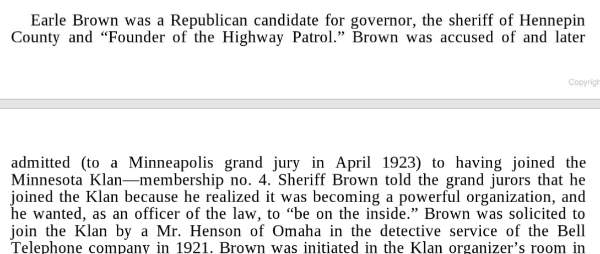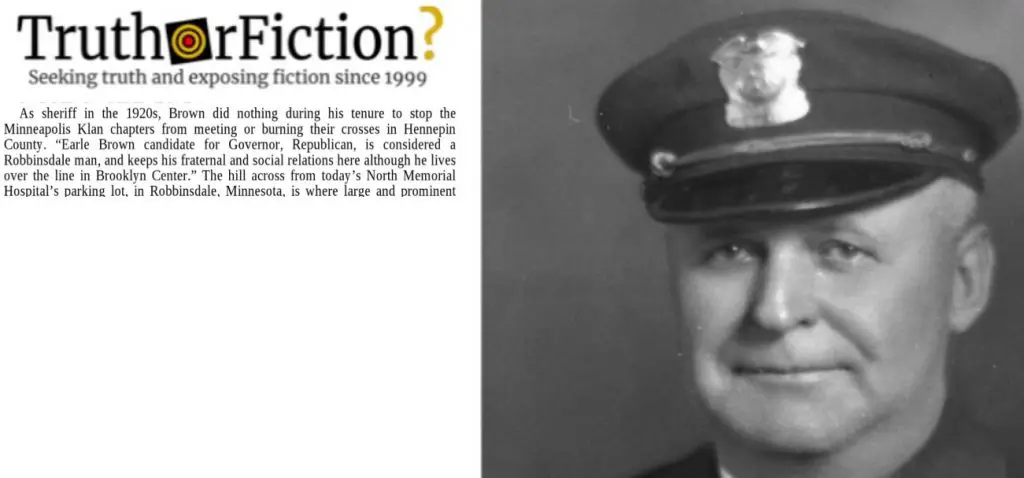Increased scrutiny on the town of Brooklyn Center, Minnesota following the extrajudicial killing of 20-year-old Daunte Wright in April 2021 also brought back to light the community’s historical link with the infamous white supremacist group the Ku Klux Klan.
Earle Brown’s membership in the hate group was brought to light in the 2013 book The Ku Klux Klan in Minnesota. According to the author, historian Elizabeth Dorsey Hatle:
Brown was accused of and later admitted (to a Minneapolis grand jury in April 1923) to having joined the Minnesota Klan—membership no. 4. Sheriff Brown told the grand jurors that he joined the Klan because he realized it was becoming a powerful organization, and he wanted, as an officer of the law, to “be on the inside.”
Brown was solicited to join the Klan by a Mr. Henson of Omaha in the detective service of the Bell Telephone company in 1921. Brown was initiated in the Klan organizer’s room in the Dyckman Hotel a few months before April 1923. The Dyckman Hotel was regularly reported on in the Midway News as being the meeting spot for Twin Cities Klan activities.

“As sheriff in the 1920s, Brown did nothing to stop the Minneapolis Klan chapters from meeting or burning their crosses in Hennepin County,” she wrote.
Based on Hatle’s findings, Brown was not active in the KKK at the time of the town’s formation on his farm in 1911.
In a separate report published by the Minnesota Historical Society (MHS), Hatle and fellow researcher Nancy M. Vaillancourt wrote that the Klan had “found a home” in the state during the 1920s. The MHS published a separate report noting that by the time Brown made his admission to the grand jury, Ku Klux Klan activity in the state was already surging:
Ku Klux Klan activity in Minnesota appears to have begun in 1921 and grown over the ensuing few years. Intolerance for “outsiders”–including Catholics, German and Jewish immigrants, and black workers who relocated from the South–had risen in the state during World War I and even more so when the war’s labor boom ended. By 1923 Minnesota was home to a reported 51 chapters of the KKK with over 30,000 members, though many were not active.
Hatle also reported in her book that four years after admitting to joining the group — while serving as Hennepin County Sheriff — Brown was elected vice-president of the Minnesota Eugenics Society. In 1932, Brown ran for governor as a Republican. During his campaign, she wrote, Brown again admitted to “joining hands” with the Klan, but he claimed that he was doing so for spying purposes.
As the Brooklyn Park Sun Post reported in July 2020, Brown’s ties to the town (now a suburb of Minneapolis) ran deep:
The often-repeated history of Brown details his life as a Hennepin County Sheriff, gubernatorial candidate, founder of the Minnesota Highway Patrol, and owner of the farmland that would later encompass a large portion of Brooklyn Center. In 1911, the Village of Brooklyn Center was formed at a meeting at Brown’s farm, and without any children of his own, he gave his farm to the University of Minnesota upon his death in 1963.
Consequently, the town named not only local streets after him but a summer festival, a community center, and an elementary school. But in June 2020, the city’s leaders moved to rename the school Brooklyn Center Elementary based on Hatle’s reporting. Hatle — who works as a history teacher in Minneapolis — reportedly contacted Mayor Mike Elliott and presented him with some of her findings on Brown’s activities.
The newspaper also reported in January 2021 that the council voted unanimously to rebrand the local festival as “Brooklyn Center Days” while seeking local input on a permanent name change.
“I think for the reasons stated, a new name is necessary,” Elliott said at the time. “I do believe talking with the community and getting ideas from the community in terms of what a new name will be for our community celebration, [a name] that is reflective of the community and embraces all members of our community is the way to go.”
However, at least one local space still bears Brown’s name — the Earle Brown Heritage Center. The venue’s website makes no reference to Brown’s links to the Ku Klux Klan.
Brown Center was placed under national scrutiny after Wright was shot and killed by a local police officer, Kim Potter, on April 11 2021. Both Potter and Police Chief Tim Gannon subsequently resigned their positions amid the investigation into her actions, and the city council moved to give Elliott direct supervision over the police department.

